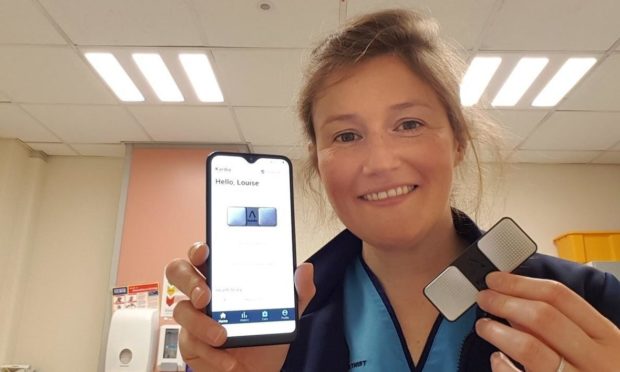A smartphone attachment which costs less than £100 is helping to save the lives of people at risk from strokes.
The Kardia gadgets have been helping find abnormal heart rhythms in patients, whose symptoms could otherwise have been missed.
They are now being used by podiatrists across the NHS board in the Western Isles to vastly speed up treatment times.
An irregular pulse is one of the symptoms of Atrial Fibrillation (AF), a heart condition that can put someone at greater risk of suffering a stroke.
The earlier it is identified, the sooner they can receive treatment such as blood thinners to reduce the chance they could face “disabling consequences”.
Previously in the Western Isles, patients’ vascular health was checked during routine podiatry appointments.
If anything untoward emerged, a note would be sent to the GP for further assessment.
This could include the use of a 12-lead ECG (electrocardiogram) to check the rhythm of the patient’s heart for abnormalities. But, if the issues were not there at that precise moment, they could be missed.
Using the Kardia gadgets, however, these steps can be skipped in place of a 30-second check using a small handheld device during a podiatry appointment.
Any information is then instantly sent to specialist nurses for review, and then to the patient’s GP with a confirmed diagnosis.
Already, in cases where a podiatrist has detected an abnormal rhythm, 50% of patients have had a confirmed diagnosis of a heart problem.
Gadgets making ‘huge improvement’
Podiatrist Louise Campbell has described the technology as “invaluable”.
She said: “As podiatrists, we regularly listen to the pulses of the lower limb as part of our routine assessment.
“Now, with the introduction of the Kardia monitor to the Western Isles podiatry team, we are able to easily capture an ECG at the moment an altered rhythm is noted, which the cardiac specialist nursing team can then interpret.
“This not only saves valuable time for the patient and GP surgeries, but can also potentially save lives should AF be detected and diagnosed earlier as a result.”
Cardiac nurse consultant Debra Vickers said: “This new initiative is a huge improvement from the previous care pathway.
“Previously all patients found to have an irregular pulse at their podiatry appointment would require a 12-lead ECG at their GP practice.
“This could take time to organise, and the rhythm may not have been present at that time so be missed.
“We have been using these devices for a few years now within the local cardiac team and we have seen first-hand how they increase the chances of abnormal heart rhythm detection, whilst also reducing attendance through GP practices.”
